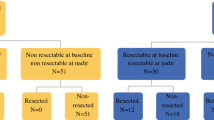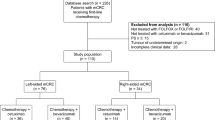Abstract
Background
Primary tumor location is considered a predictor of overall survival (OS) in RAS wild-type (WT) metastatic colorectal cancer (mCRC) treated with bevacizumab (BEV) or an anti-epidermal growth factor antibody (cetuximab or panitumumab [CET/PAN]) as first-line molecularly targeted therapy. BEV is recommended for right-sided mCRC and CET/PAN for left-sided mCRC based on post-hoc analyses of clinical trial data, but real-world evidence is lacking.
Methods
We retrospectively collected data of patients who started BEV or CET/PAN plus 5-fluorouracil-based doublet chemotherapy between January 2013 and December 2016 as first-line treatment for RAS WT mCRC at any of 24 Japanese institutions. OS was compared between the BEV and CET/PAN groups according to primary tumor location by Cox multivariate regression analysis in the full cohort and in a propensity score-matched cohort.
Results
In total, 935 patients were enrolled. Median OS was 24.6 months with BEV and 20.9 months with CET/PAN in right-sided mCRC (n = 213; adjusted hazard ratio [HR] 0.73, 95% confidence interval [CI] 0.50–1.06) and 35.7 months and 30.0 months, respectively, in left-sided mCRC (n = 722; adjusted HR 0.92, 95% CI 0.74–1.13). In the propensity score-matched cohort, OS was significantly better in the BEV group than in the CET/PAN group in right-sided mCRC (HR 0.52, 95% CI 0.28–0.96) but was not significantly different in left-sided mCRC (HR 0.78, 95% CI 0.53–1.07).
Conclusion
Real-world data showed that OS was better with BEV than with CET/PAN in right-sided mCRC. However, there was no significant difference in OS in left-sided mCRC.



Similar content being viewed by others
References
Benson AB, Venook AP, Al-Hawary MM et al (2021) Colon cancer, version 2.2021, NCCN clinical practice guidelines in oncology. J Natl Compr Cancer Netw 19:329–359
Van Cutsem E, Cervantes A, Adam R et al (2016) ESMO consensus guidelines for the management of patients with metastatic colorectal cancer. Ann Oncol 27:1386–1422
Yoshino T, Arnold D, Taniguchi H et al (2018) Pan-Asian adapted ESMO consensus guidelines for the management of patients with metastatic colorectal cancer: a JSMO-ESMO initiative endorsed by CSCO, KACO, MOS, SSO and TOS. Ann Oncol 29:44–70
Hashiguchi Y, Muro K, Saito Y et al (2020) Japanese Society for Cancer of the Colon and Rectum (JSCCR) guidelines 2019 for the treatment of colorectal cancer. Int J Clin Oncol 25:1–42
Heinemann V, von Weikersthal LF, Decker T et al (2014) FOLFIRI plus cetuximab versus FOLFIRI plus bevacizumab as first-line treatment for patients with metastatic colorectal cancer (FIRE-3): a randomised, open-label, phase 3 trial. Lancet Oncol 15:1065–1075
Venook AP, Niedzwiecki D, Lenz HJ et al (2017) Effect of first-line chemotherapy combined with cetuximab or bevacizumab on overall survival in patients with KRAS wild-type advanced or metastatic colorectal cancer: a randomized clinical trial. JAMA 317:2392–2401
Stintzing S, Modest DP, Rossius L et al (2016) FOLFIRI plus cetuximab versus FOLFIRI plus bevacizumab for metastatic colorectal cancer (FIRE-3): a post-hoc analysis of tumour dynamics in the final RAS wild-type subgroup of this randomised open-label phase 3 trial. Lancet Oncol 17:1426–1434
Venook AP, Niedzwiecki D, Lenz H-J et al (2014) CALGB/SWOG80405: Phase III trial of irinotecan/5-FU/leucovorin (FOLFIRI) or oxaliplatin/5-FU/leucovorin (mFOLFOX6) with bevacizumab (BV) or cetuximab (CET) for patients (pts) with KRAS wild-type (wt) untreated metastatic adenocarcinoma of the colon or rectum (MCRC). J Clin Oncol 32(15 Suppl):LBA3
Rivera F, Karthaus M, Hecht JR et al (2017) Final analysis of the randomised PEAK trial: overall survival and tumour responses during first-line treatment with mFOLFOX6 plus either panitumumab or bevacizumab in patients with metastatic colorectal carcinoma. Int J Colorectal Dis 32:1179–1190
Holch JW, Ricard I, Stintzing S et al (2017) The relevance of primary tumour location in patients with metastatic colorectal cancer: a meta-analysis of first-line clinical trials. Eur J Cancer 70:87–98
Arnold D, Lueza B, Douillard JY et al (2017) Prognostic and predictive value of primary tumour side in patients with RAS wild-type metastatic colorectal cancer treated with chemotherapy and EGFR directed antibodies in six randomized trials. Ann Oncol 28:1713–1729
Petrelli F, Tomasello G, Borgonovo K et al (2017) Prognostic survival associated with left-sided vs right-sided colon cancer: a systematic review and meta-analysis. JAMA Oncol 3:211–219
Tejpar S, Stintzing S, Ciardiello F et al (2017) Prognostic and predictive relevance of primary tumor location in patients with RAS wild-type metastatic colorectal cancer: retrospective analyses of the CRYSTAL and FIRE-3 trials. JAMA Oncol 3:194–201
You XH, Jiang YH, Fang Z et al (2020) Chemotherapy plus bevacizumab as an optimal first-line therapeutic treatment for patients with right-sided metastatic colon cancer: a meta-analysis of first-line clinical trials. ESMO Open 5:e00065
Cremolini C, Loupakis F, Ruzzo A et al (2010) Predictors of benefit in colorectal cancer treated with cetuximab: are we getting “Lost in TranslationAL”? J Clin Oncol 28:e173–e174 (author reply e175–e176)
Hutajulu SH, Paramita DK, Santoso J et al (2018) Correlation between vascular endothelial growth factor—a expression and tumor location and invasion in patients with colorectal cancer. J Gastrointest Oncol 9:1099–1108
Bendardaf R, Buhmeida A, Hilska M et al (2008) VEGF-1 expression in colorectal cancer is associated with disease localization, stage, and long-term disease-specific survival. Anticancer Res 28:3865–3870
Missiaglia E, Jacobs B, D’Ario G et al (2014) Distal and proximal colon cancers differ in terms of molecular, pathological, and clinical features. Ann Oncol 25:1995–2001
Aggarwal H, Sheffield KM, Li L et al (2020) Primary tumor location and survival in colorectal cancer: a retrospective cohort study. World J Gastrointest Oncol 12:405–423
Marques RP, Godinho AR, Heudtlass P et al (2020) Cetuximab versus bevacizumab in metastatic colorectal cancer: a comparative effectiveness study. J Cancer Res Clin Oncol 146:1321–1334
Sagawa T, Sato Y, Hirakawa M et al (2020) Clinical impact of primary tumour location, early tumour shrinkage, and depth of response in the treatment of metastatic colorectal cancer with first-line chemotherapy plus cetuximab or bevacizumab. Sci Rep 10:19815
Grassadonia A, Di Marino P, Ficorella C et al (2019) Impact of primary tumor location in patients with RAS wild-type metastatic colon cancer treated with first-line chemotherapy plus anti-EGFR or anti-VEGF monoclonal antibodies: a retrospective multicenter study. J Cancer 10:5926–5934
Bennouna J, Sastre J, Arnold D et al (2013) Continuation of bevacizumab after first progression in metastatic colorectal cancer (ML18147): a randomised phase 3 trial. Lancet Oncol 14:29–37
Van Cutsem E, Tabernero J, Lakomy R et al (2012) Addition of aflibercept to fluorouracil, leucovorin, and irinotecan improves survival in a phase III randomized trial in patients with metastatic colorectal cancer previously treated with an oxaliplatin-based regimen. J Clin Oncol 30:3499–3506
Tabernero J, Yoshino T, Cohn AL et al (2015) Ramucirumab versus placebo in combination with second-line FOLFIRI in patients with metastatic colorectal carcinoma that progressed during or after first-line therapy with bevacizumab, oxaliplatin, and a fluoropyrimidine (RAISE): a randomised, double-blind, multicentre, phase 3 study. Lancet Oncol 16:499–508
Rowland A, Dias MM, Wiese MD et al (2015) Meta-analysis of BRAF mutation as a predictive biomarker of benefit from anti-EGFR monoclonal antibody therapy for RAS wild-type metastatic colorectal cancer. Br J Cancer 112:1888–1894
Bylsma LC, Gillezeau C, Garawin TA et al (2020) Prevalence of RAS and BRAF mutations in metastatic colorectal cancer patients by tumor sidedness: a systematic review and meta-analysis. Cancer Med 9:1044–1057
Yoshino T, Uetake H, Tsuchihara K et al (2017) Rationale for and design of the PARADIGM study: randomized phase III study of mFOLFOX6 plus bevacizumab or panitumumab in chemotherapy-naïve patients with RAS (KRAS/NRAS) wild-type, metastatic colorectal cancer. Clin Colorectal Cancer 16:158–163
Acknowledgements
This research received no specific grant from any funding agency in the public, commercial, or not-for-profit sectors.
Author information
Authors and Affiliations
Corresponding author
Ethics declarations
Conflict of interest
AT has received personal fees from Eli Lilly, personal fees from Taiho Pharmaceutical, grants and personal fees from Ono Pharmaceutical, personal fees from Chugai Pharma, grants and personal fees from Takeda, personal fees from Merck Serono, grants from Merck Sharp & Dohme, grants from Eisai, grants from Bayer Yakuhin, grants from Bristol Myers Squibb, all outside the submitted work. HY has received honoraria from Taiho Pharmaceutical, Chugai Pharma, Eli Lilly Japan, Merk Biopharma, Yakult Honsha, Bayer Yakuhin, and Takeda Pharmaceutical, all outside the submitted work. TE has received grants from MSD, Novartis, Ono, Astellas, Astellas Amgen Biopharma, BeiGene, Ignyta, Array BioPharma, Merck Serono, and Dainippon Sumitomo as well as honoraria from Chugai, all outside the submitted work. TT received personal fees from Daiichi Sankyo Co., Ltd. as well as grants from Takeda Pharmaceutical Co., Ltd., Chugai Pharmaceutical Co., Ltd., Taiho Pharmaceutical Co., Ltd., BeiGene Co., Ltd., and Ono Pharmaceutical Co., Ltd., all outside the submitted work. EB received research funding from Ono, Merck Sharp & Dohme, Eisai, Taiho, Bayer, Eli Lilly, Chugai, and Daichi-Sankyo as well as honoraria for lecture and advisory roles from Ono, Chugai, Taiho, Tsumura, Eli Lilly, Merck Sharp & Dohme, Sanofi, Miyarisan, Daiichi-Sankyo, AstraZeneca, Astellas, all outside the submitted work. TD received personal fees from Sysmex, Ono Pharmaceutical, and Sawai, all outside the submitted work. HU received research funding for his institution from Chugai and Takeda pharmaceutical companies, both outside the submitted work. TI, HS, HY, HU, MT, TS, HO, YT, AT, MG MSa, SO, KS, TF, MSh, KN, and YS declare no competing interests.
Additional information
Publisher's Note
Springer Nature remains neutral with regard to jurisdictional claims in published maps and institutional affiliations.
Supplementary Information
Below is the link to the electronic supplementary material.
About this article
Cite this article
Ito, T., Takashima, A., Yamazaki, K. et al. Primary tumor location as a predictor of survival in patients with RAS wild-type colorectal cancer who receive molecularly targeted drugs as first-line therapy: a multicenter real-world observational study by the Japanese Society for Cancer of the Colon and Rectum. Int J Clin Oncol 27, 1450–1458 (2022). https://doi.org/10.1007/s10147-022-02208-7
Received:
Accepted:
Published:
Issue Date:
DOI: https://doi.org/10.1007/s10147-022-02208-7




